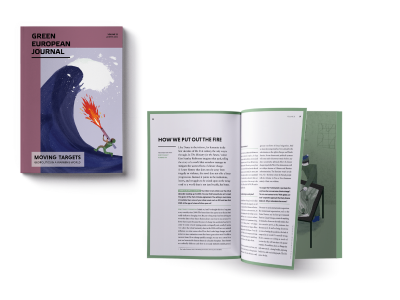As part of this edition’s “Rising Tides, Rising Tensions” series on the front lines of the ecological crisis around the world, we hear from writers about the geopolitics of climate change in Brazil, Morocco, Nigeria, Serbia, and Turkey. In this piece, Predrag Momčilović, examines how geopolitical relations impact Serbian discussions about politics, energy and the future.
In a world affected by climate change and sharp energy price rises, Serbia, as a semi-peripheral country, is increasingly caught between the need to implement the energy transition while guaranteeing its energy supply and securing its geopolitical position between the EU, Russia, and China. It is likely to become a source of cheap resources to fuel the transition, but at what cost?
Serbia’s energy mix is still largely based on fossil fuels. The largest energy source is lignite coal, mined domestically, from which about 70 per cent of electricity is obtained. Oil and natural gas, which Serbia mainly imports, are also important sources. The rising energy prices that hit Europe in autumn 2021 did not bypass Serbia, raising the question of energy sovereignty. The Serbian president recently commented that thanks to domestic coal and “favourable” gas from Russia, the country will be safe this winter. This narrative is an obstacle to starting a green and fair energy transition.

Serbia’s energy transition is stuck at its very beginning. Despite frequent discussion, not much has been done politically. Over the second half of 2021, the minister of energy and mining began to advocate accelerating the energy transition. The senior management of Elektroprivreda Srbije, the largest state-owned energy company, remains fiercely opposed. Serbia’s opposition political parties are only in the initial phase of adopting a green agenda, so they rarely take public positions on energy matters. The exception is the local green political movement Ne davimo Beograd [Don’t Let Belgrade D(r)own], which argues that a fast but fair energy transition can be achieved through the rollout of energy efficiency measures.
Serbia is caught between the need to implement the energy transition, while guaranteeing its energy supply, and securing its geopolitical position between the EU, Russia, and China.
Serbia’s energy and climate policy lies at the crossroads between several major powers. The former state oil company was privatised in 2008 and is now owned by Russia’s Gazprom as a private monopoly. Despite announcing its intention to cut CO2 emissions, Serbia is building a new block of the Kostolac B3 lignite-fired power plant with the help of Chinese loans. At the same, the country is in EU accession negotiations and, by joining the Energy Community, has committed to moving towards EU energy and climate policies.
Meanwhile, jadarite – a mineral that contains a large percentage of lithium – was recently discovered near Loznica in western Serbia. Lithium is a strategic resource necessary for the green transformation, and demand for this mineral is expected to rise. This has sparked the interest of foreign companies in its exploitation. Australian giant Rio Tinto, known primarily for leaving devastation and war in the wake of its mines, is the main contender. According to current economic and geopolitical trends, Serbia may become one of Europe’s main lithium suppliers, but questions remain. Whose green transformation will this power? And who will pay for the environmental and agricultural damage wrought by the exploitation of Serbia’s mineral wealth?
Lithium batteries and electric cars will not be made in Serbia; they will be manufactured much closer to the economic centre. Aside from the revenue received from the ore, which is nearly the lowest in Europe, it is feared that all that Serbia will be left with in exchange is polluted land, water, and air.

